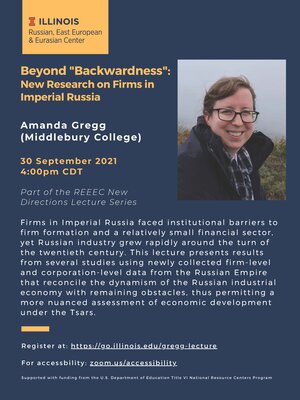By Felix Cowan (PhD Candidate, History)
On September 30, 2021, REEEC faculty, students, and staff gathered online for a talk by Dr. Amanda Gregg (Assistant Professor of Economics, Middlebury College) titled “Beyond ‘Backwardness’: New Research on Firms in Imperial Russia.” Dr. Gregg offered an overview of her research on late imperial Russian economic history, focusing onan extensive database of approximately 50,000 industrial firms compiled from governmental surveys conducted in 1894, 1900, and 1908. Dr. Gregg has used this database for a series of studies on the late imperial Russian economy, particularly exploring how rapid industrial growth complicates the classic story of the Russian Empire’s poverty and economic “backwardness.”
After this introduction, Dr. Gregg gave us an in-depth look at her research on incorporation in imperial Russia. Incorporation offered firms important benefits including legal personhood, limited liability for investors, capital lock-in, and access to stock markets. However, incorporation also required special permission from the tsar or the Minister of Finance, an expensive, time-consuming process not available to every firm. Looking across the 1894-1908 period covered by her database, Dr. Gregg analyzed which firms incorporated and why, finding that high-performing but capital-constrained firms incorporated to unlock access to the capital needed to facilitate further expansion. Incorporation brought additional investment, fueling rapid growth by opening the door to productivity increases like purchasing new machinery. This in turn explains why a relatively small number of corporations in imperial Russia nevertheless accounted for nearly half of all industrial output: they were rare but extremely important for the economy. Finally, Dr. Gregg offered glimpses into future research on how corporate structures affected the performance of individual firms and the Russian economy as a whole and concluded that, alongside the legacies of serfdom, barriers to incorporation proved to be one of Russia’s main hindrances to economic development.
Following the talk, Dr. Gregg answered wide-ranging audience questions on subjects including the importance of serfdom and geography, international economic and legal linkages, how industrial firms compared to corporations in other sectors, and how she conducts research alongside collaborators and student researchers. This stimulating discussion was a worthy accompaniment to a fascinating talk, covering both the wonderful research already completed and extremely promising future work exploring these exciting topics in further depth.
Felix Cowan is a PhD Candidate in History at the University of Illinois at Urbana-Champaign.
